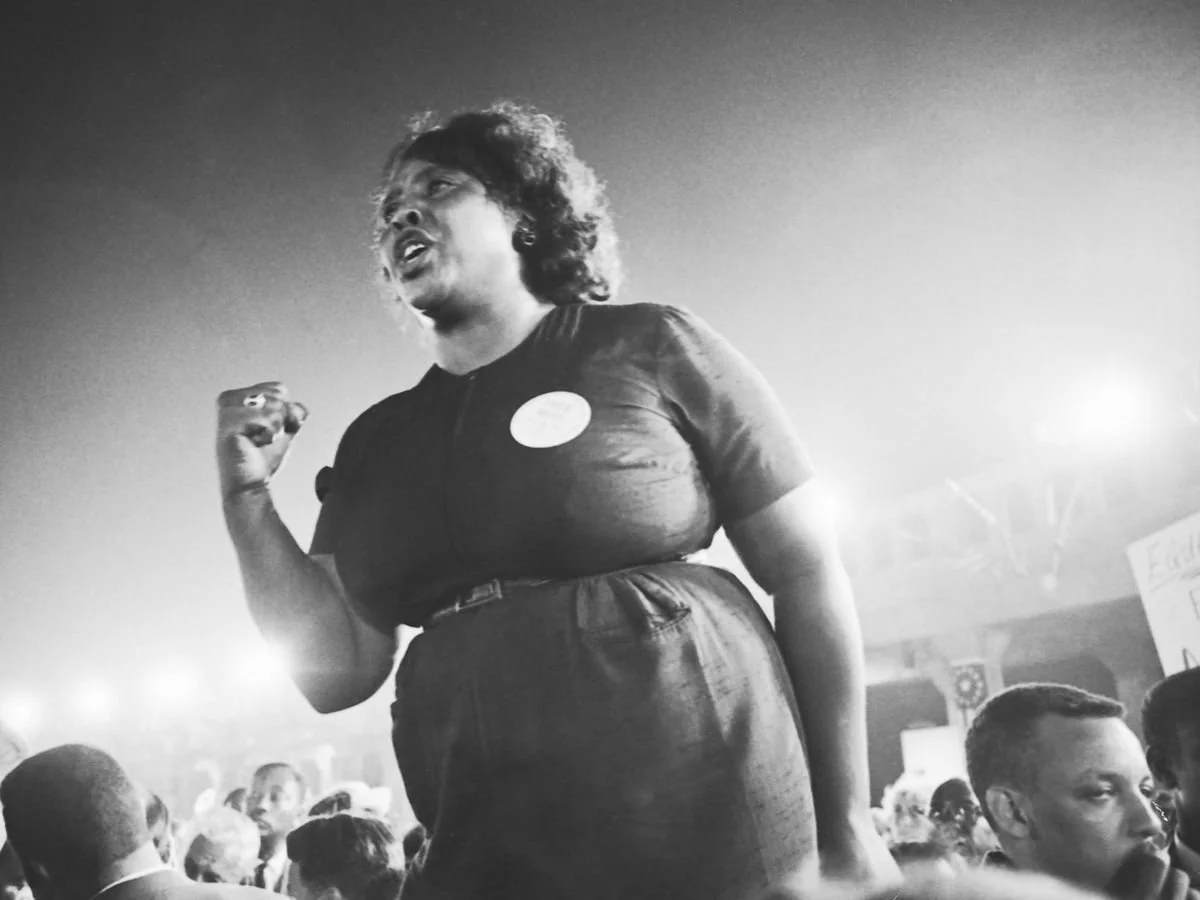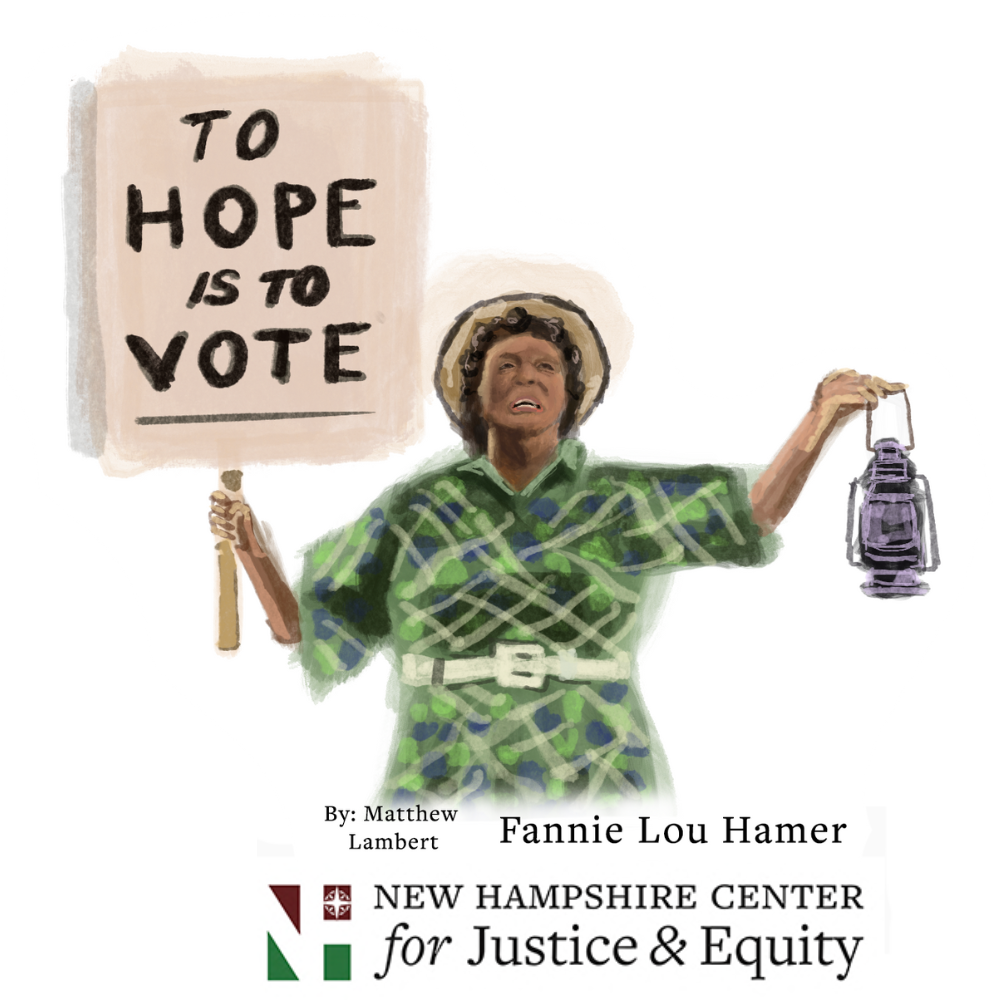Fannie Lou Hamer: Defending the Right to Vote
In our Icon Series, we give thanks to those whose lives have laid the foundation for our journey toward justice and equity. In this season of being focused on showing appreciation, the New Hampshire Center for Justice & Equity celebrates the extraordinary life of Fannie Lou Hamer.
Fannie Lou Hammer rallying supporters on behalf of the Mississippi Freedom Democratic Party. Image credits: Methodist Church Global Ministries/Kenneth Thompson
About Fannie Lou Hamer
Fannie Lou Hamer was a fearless civil rights leader whose voice rose from the cotton fields of Mississippi to the national stage. She was a powerful advocate for voting rights, economic justice, and Black political representation. As a co-founder of the Mississippi Freedom Democratic Party, she exposed racial violence and voter suppression. Through grassroots organizing, Hamer fought for dignity, self-determination, and equality.
Life in the Cotton Fields and Awakening to Injustice
Fannie Lou Townsend Hamer was born on October 6, 1917, in Ruleville, Mississippi. She was the youngest of Lou Ella and James Lee Townsend’s twenty children; her parents were sharecroppers living in the Mississippi Delta. At around six years old, Hamer started joining her family picking cotton, and by age twelve, she had left school to work full-time.
In 1944, she married Perry “Pap” Hamer. For nearly two decades, they worked together on W. D. Marlow’s plantation near Ruleville. Since Hamer was one of the few workers who could read and write, she earned the job of timekeeper. Although this was a less physically demanding job, she endured the deeply unfair and harsh conditions of sharecropping life.
In 1961, Hamer underwent surgery to remove a uterine tumor, and the white doctor performed a hysterectomy without her consent, which made her unable to have children. The forced sterilization of Black women was a common practice, referred to as a “Mississippi appendectomy,” and this injustice set Hamer on the activism path. The Hamers later adopted two daughters.
Upholding Voting Rights with Courage and Faith
Inspired by a Student Nonviolent Coordinating Committee (SNCC) meeting in her region, which encouraged African Americans to register to vote, Hamer became a community organizer in the summer of 1962. She led 17 of her neighbors to complete voter registration at the Indianola courthouse in Mississippi, but the group was met with intimidation, discriminatory literacy tests, and police harassment.
Upon returning, Hamer was fired by the plantation’s owner for attempting to register to vote and forced to leave the place she had called home for almost two decades, which only strengthened her resolve. Her leadership caught the SNCC’s attention, and she became a field secretary, traveling across Mississippi to encourage others to register to vote.
Hamer’s faith and voice became powerful tools in her organizing, as she often sang spirituals during protests. In 1963, following a successful voter registration campaign in South Carolina, Hamer and other Black women were arrested for sitting at the “whites-only” bus station lunch counter in Winona, Mississippi. They were brutally beaten, and Hamer was left with permanent damage to her kidneys.
“Nobody’s free until everybody’s free.”
Challenging Power and Demanding Representation
By 1964, Hamer had gained a national reputation and co-founded the Mississippi Freedom Democratic Party (MFDP) to challenge segregation in the all-white Democratic Party in Mississippi. She helped organize the MFDP’s Summer Freedom movement, which brought hundreds of Black and white college students to help with voter registration in the segregated South.
At the Democratic National Convention in the same year, Hamer gave a poignant testimony of her experience with racism and violence before the Credentials Committee, calling for integrated state delegations. President Lyndon Johnson, who was up for re-election, held a televised press conference to draw attention away from Hamer’s speech. However, he incidentally pushed it towards a much larger audience, as the speech was later rebroadcast during prime time, accelerating awareness of the racial injustices in Mississippi and beyond.
Hamer later announced her candidacy for the Mississippi House of Representatives, but was barred from the ballot, leading an estimated 60,000 Black voters to write in her name on “Freedom Ballots.” Although the Democratic Party ultimately refused to seat the MFDP at the insistence of President Johnson, Hamer’s activism was part of a series of events that led to the passage of the 1965 Civil Rights Act.
Economic Justice and Community Empowerment
During the remaining half of the 1960s, Hamer launched programs that addressed poverty, food insecurity, land ownership, and self-sufficiency, as she understood that political power without economic stability would not bring full freedom.
One of her major initiatives was the Freedom Farm Cooperative (FCC), founded in 1969. The cooperative purchased land for Black farmers, established food gardens, pig-raising programs, and built low-income housing and small enterprises. In 1971, Hamer co-founded the National Women’s Political Caucus, pushing for women, particularly Black women, to have a stronger voice in electoral politics.
Honoring Fannie Lou Hamer’s Life and Impact
Hamer’s health declined due to heart disease and breast cancer, and she passed away on March 14, 1977, in Mound Bayou, Mississippi. Hundreds of neighbors and civil rights leaders gathered in a Ruleville church for her funeral, including the U.S. delegate to the United Nations, who praised the importance of Hamer’s activism for the Civil Rights Movement.
Throughout her fight for justice, Hamer faced constant threats, beatings, arrests, and harassment, but her legacy prevailed. Her most famous quote — “I’m sick and tired of being sick and tired”— still calls people to action today. In January 2025, she was posthumously awarded the Presidential Medal of Freedom by President Joe Biden, one of the highest civilian honors in the United States.
In honoring Fannie Lou Hamer as an NHCJE Icon, we celebrate a woman whose courage, truth-telling, and commitment to political and economic justice continue to guide us toward freedom.
Learn more about Fannie Lou Hamer
https://www.womenshistory.org/education-resources/biographies/fannie-lou-hamer - Womenshistory.org
https://www.biography.com/activists/fannie-lou-hamer - Biography.com
https://www.pbs.org/wgbh/americanexperience/features/freedomsummer-hamer/ - PBS
https://nmaahc.si.edu/explore/stories/how-fannie-lou-hamer-challenged-nation - National Museum of African American History & Culture
Call to Action
Following in the footsteps of the civil rights icons who came before us, New Hampshire is facing unprecedented challenges, and NHCJE is preparing to fight the ‘good fight’.
Will you help us continue their legacy by investing in our work this Giving Tuesday?



